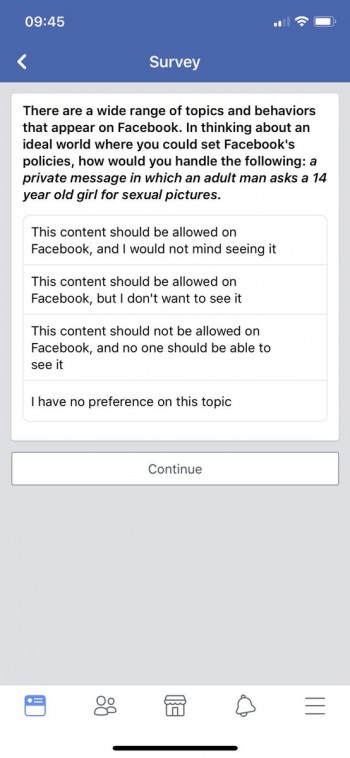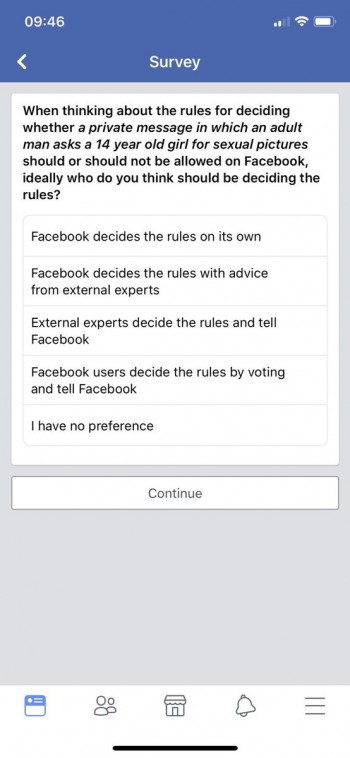How Can We Ever Trust Facebook?
Steve Jobs was an admired figure in industry, not just because he built a big company, but for the integrity that he brought to it.
By contrast, Facebook is a capricious, megalomaniacal, despotic company run by a petulant nerd who is quickly becoming despised by his customers.
The examples of Facebook’s abuses and incredible stupidities appear literally daily now. How can we allow this to go on without regulatory intervention and holding Facebook legally and financially responsible?
Now For Their Latest Outrage!
Take a couple of moments and think about the meaning behind this?
Someone actually had to desire, and get approval from management to even ask this of Facebook Users. Who in their right mind would even contemplate such a question?
Facebook Survey Asks Users if They Want Pedophiles to Share MORE Child Porn Participants asked if they approve of pedophilia and ‘sexual pictures’ of children
A Facebook survey asks users if they condone pedophilia
A new Facebook survey has caused outrage after it asked users whether they would be happy for pedophiles to share more child pornography on the platform. The “social” network published the stomach-churning questionnaire that asked users whether pedophiles should be allowed to solicit “sexual pictures” from underage girls. An unspecified number of users were asked to take part in the cringe-worthy poll that emerged at the top of Facebook’s homepage this past weekend, according to reports. Participants were asked on whether they approved of pedophilia and if they “would mind seeing” sexually explicit images of children that pedophiles were sharing, with one question in the survey reading:
“In thinking about an ideal world where you could set Facebook’s policies, how would you handle the following: a private message in which an adult man asks a 14-year-old girl for sexual pictures.”
NY Post reports: The disgusting multiple-choice poll gave users the option to condone the sick behavior, allowing them to vote that the “content should be allowed on Facebook, and I would not mind seeing it.”Another possible, nausea-inducing response was that:
“the content should be allowed on Facebook, but I don’t want to see it.”
The twisted survey was spotted by an editor at the Guardian, who published screenshots of it on Twitter.
“I[s] making it secret the best Facebook can offer here?” Jonathan Haynes wrote as he tweeted out the “I don’t want to see it” response in the poll. But how many responded favorably to the poll?
Click Each Image To See Full Size
Yet another bone-headed question asked users who should decide whether pedophilic content was allowed on Facebook — users, Facebook and users, just Facebook or an outside entity.On Monday, the social networking giant headed by Mark Zuckerberg admitted that it was a “mistake” to publish the survey, which appeared to suggest that Facebook execs were openly debating whether to allow pedophiles on the site.
“We run surveys to understand how the community thinks about how we set policies,” Facebook vice president Guy Rosen said in response to Haynes’ tweet.“But this kind of activity is and will always be completely unacceptable on FB.”
In a statement to The Post, Facebook said the survey has been taken down since it refers to offensive content that is already prohibited on Facebook and that [they] have no intention of allowing.
“We have prohibited child grooming on Facebook since our earliest days, we have no intention of changing this, and we regularly work with the police to ensure that anyone found acting in such a way is brought to justice,” Facebook said.
It’s not the first time that the Palo Alto, Calif., company has found itself in hot water regarding pedophilia on its platform. In 2015, The Post’s John Crudele asked Facebook to take down a pedophilia-friendly page on its network — but the company said it couldn’t because it didn’t violate its terms of service. After one user started a boycott of Facebook advertisers, the company relented.
Facebook then signed a deal with the NY attorney general promising to help develop software to detect the problem, Crudele reported.
Read more at: http://www.neonnettle.com/news/4408-facebook-survey-asks-users-if-they-want-pedophiles-to-share-more-child-porn
© Neon Nettle






I don’t really understand how Facebook could, or would, submit such a survey, regardless of whether they would ever allow it or not. Creating, possessing, and distributing child pornography are all completely illegal in most Western countries, so it isn’t even their call to make. It would be like F.B staff debating whether they should allow the marketing and sale of heroine or cocaine on a F.B page, or a murder to be planned over it,they are not outside the law even if they think they are.
j aimerais bien sais quand on dis a facebook que telle ou telle personne se sont des fakes africains qui utilisent des photos volées reagissent en les supprimant et nous aider a combattre se fleau
It is very hard when we say the same thing day in and day out. Over and over a million times. It is in our menu. It is in our posts. It is all over our pages and social media. How do you report scammers? It starts by just paying attention and reading. You were scammed because you were not paying attention, and sadly most victims still just look at a headline and do not look any further. The answers are always there if you look, but are you looking? You can report scammers here on this website or on http://www.Anyscam.com It is up to you to pay attention!
C’est très difficile quand nous disons la même chose jour après jour. Plus d’un million de fois. C’est dans notre menu. C’est dans nos messages. C’est partout sur nos pages et les médias sociaux. Comment signalez-vous les escrocs? Cela commence par juste faire attention et lire. Vous avez été victime d’une arnaque parce que vous ne faisiez pas attention, et malheureusement la plupart des victimes regardent toujours un titre et ne regardent pas plus loin. Les réponses sont toujours là si vous regardez, mais regardez-vous? Vous pouvez signaler les escrocs ici sur ce site ou sur http://www.Anyscam.com A vous de faire attention!
That’s the worse idea people at FB are sick as hell never trust them they do everything wrong I’m deleting face book i feel sorry for people who still have it